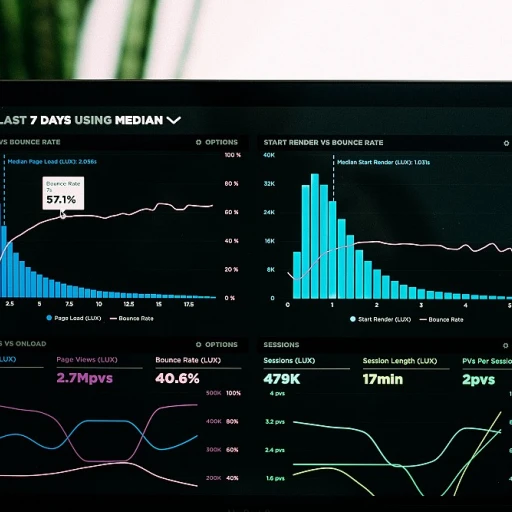
The Role of AI in SEO for Social Media
The Intersection of AI and SEO in the Digital Era
As we delve into the digital age, artificial intelligence (AI) has emerged as a transformative force, reshaping business landscapes, including SEO strategies for social media companies. AI stands at the forefront of search social marketing, where businesses engage with customers across various platforms, integrating search behaviors with social interactions to maximize growth and revenue.
Today, companies constantly strive to enhance their market share and valuation multiple by deploying innovative marketing strategies that leverage the expansive capabilities of AI. This integration allows businesses to anticipate customer behavior, tailor content more precisely, and ultimately improve conversion paths. The result is a fine-tuned digital marketing approach that bolsters brand engagement and magnifies sales growth.
The emergence of digital platforms has affected traditional marketing paradigms, forcing business owners to rethink their strategies. AI fuels these transformations, driving data analysis that uncovers fresh insights about customer preferences and social advertising techniques. AI’s presence in search engine optimization cannot be overstated, as it influences content creation, metadata optimization, and performance advertising metrics.
This synergy between AI and SEO does not just stop at optimizing keywords or analyzing ebitda multiples; it extends to understanding the intricate connections between various media formats and consumer interactions. Digital businesses, particularly in the ecommerce sphere, capitalize on AI’s potential to propel them ahead of their competitors through sophisticated user engagement strategies and refined customer experiences.
Ultimately, the evolution of AI in search engine optimization is only beginning to unfurl, challenging companies to elevate their social media presence and harness the power of personalized content to create ongoing customer loyalty and increased revenue streams.
Understanding the Multiplier Effect
The Impact of AI on Amplifying Effects in Social Media Companies
In the digital marketing world, understanding how artificial intelligence (AI) amplifies the effectiveness of social media strategies is crucial. This rise of conversational AI offers businesses a robust way to enhance their reach and impact on social platforms. By integrating AI technologies, companies have a better chance to optimize the multiplier effect significantly.
The multiplier effect refers to how social media interactions can swiftly expand a company’s audience reach and engagement through strategic sharing and networking. For social media companies, AI-driven tools can sharpen this effect by analyzing customer behaviors, preferences, and trends, which in turn refines their marketing strategy. Businesses can thus leverage these insights to boost their brand visibility and growth rate.
AI empowers companies to enhance their ecommerce performance by providing valuable data that supports targeted advertising and personalized content. Social advertising strategies become more efficient, enabling businesses to reach their intended audiences cost-effectively. The resultant increase in user engagement contributes to revenue growth, making AI indispensable in this framework.
However, businesses must navigate challenges with integrating search functionalities while balancing user privacy standards and data security. As AI technologies evolve, social media companies must remain agile, adapting to changes that affect valuation multiples and advertising revenue streams. It’s a clear path to sustaining business growth and optimizing the digital market share.
AI-Driven Data Analysis
Utilizing AI to Drive Effective Data Analysis
Artificial Intelligence plays a pivotal role in transforming data into meaningful insights, particularly in the realm of SEO for social media. As digital content continues to proliferate, businesses need cutting-edge tools to parse through vast datasets and discern patterns that inform strategic decisions. AI-driven data analysis empowers social media companies to harness the multiplier effect, enhancing their overall marketing strategy and revenue growth. AI algorithms can efficiently analyze user behavior and content performance, offering a detailed understanding of customer interactions with digital marketing efforts. By processing these complex data streams, businesses can refine their approach to social advertising, maximizing reach and engagement with their target audience. This level of analysis not only benefits the social media marketing strategy but also fortifies ecommerce businesses by optimizing their path conversion rates and increasing sales. Moreover, AI can automate the examination of search patterns, integrating search functionalities seamlessly into digital campaigns. This enables companies to tailor their media multiplier strategies, fostering more personalized interactions with customers and boosting brand loyalty. Businesses that utilize AI-driven insights find themselves better positioned to elevate their brand's market share and improve their valuation multiples. For social media companies, where achieving a robust valuation often correlates with user engagement metrics and advertising revenue, leveraging AI can streamline this complexity. The multiplier effect becomes a more attainable goal as AI tools provide a clearer picture of what drives successful interactions and, in turn, company growth. In essence, AI-driven data analysis offers a significant advantage by enabling business owners to make informed, data-backed decisions. This edge is essential in a competitive landscape where digital marketing performance and customer engagement determine the path forward. To further explore how businesses are integrating these insights into their strategies, you can read more about exploring the influencer marketing factory's creator economy insights.Personalization and User Engagement
Enhancing User Engagement with Personalization
In today's digital age, personalization is not just a buzzword; it's a necessity for businesses aiming to thrive in the competitive landscape of social media and digital marketing. AI in SEO offers a plethora of opportunities to tailor content and marketing strategies to meet the specific needs of your audience. This approach boosts user engagement, driving growth and sales. The concept of personalization involves using data to deliver customized experiences. In the context of social and ecommerce businesses, AI analyzes user behavior, preferences, and interactions. This data allows companies to create more relevant content, enhancing the user's path conversion and improving the overall marketing strategy. For businesses, employing AI-driven personalization in their digital marketing can result in a significant increase in their customer base and market share. By offering tailor-made experiences, a company's brand becomes more connected with its audience, which fosters customer loyalty and increases the likelihood of repeat purchases. Personalization not only benefits customer engagement but also aids in improving the advertising strategies of businesses. With the help of AI, companies can implement performance advertising that targets specific segments based on user interests, thereby optimizing revenue streams and multiplier ecommerce opportunities. Despite its numerous advantages, integrating search with personalized strategies requires careful consideration of privacy policy implications. Businesses must ensure they handle customer data responsibly to maintain credibility and trust. In doing so, they can maximize gains from AI's influence on user engagement, leading to enhanced valuation multiples and sustained business growth.Challenges in AI-Driven SEO
Overcoming AI Integration Hurdles
As the digital landscape evolves, businesses find themselves grappling with numerous challenges in integrating AI into their search engine optimization strategies. While AI holds promise for enhancing growth and optimizing engagement metrics, businesses in social media and ecommerce sectors must navigate certain obstacles to harness its full potential.
Data Privacy and Compliance
For companies, maintaining user trust is paramount, particularly when leveraging data-driven insights for SEO. Striking a balance between personalization of content and honoring privacy policy regulations is crucial. Businesses must be vigilant in adhering to data protection standards to safeguard their brand reputation and fortify customer trust—a key component in achieving sustainable growth.
Cutting Through Complexity
Implementing AI requires a clear understanding of complex algorithms and the ability to process large volumes of data. Many social media companies struggle with nuanced AI technologies, often finding it challenging to integrate social media analytics into actionable marketing strategies. A precise path conversion strategy is essential to efficiently translate data into sales and revenue enhancements.
Optimization and Scalability
Achieving a delicate balance in adapting AI for enhanced SEO while ensuring scalability remains a challenge. Not all businesses possess the resources to maintain an ongoing AI-driven optimization, which can impede growth. The multiplier effect promised by AI can lose momentum if companies fail to scale operations or optimize their digital marketing efforts properly.
Market Adaptations and Variability
The rapid fluctuations within the ecommerce business industry demand agile AI-driven responses. Business owners must remain adaptive, responding rapidly to shifts in market share and consumer behavior. This requires a strong grasp on media multipliers and established ebitda multiples to fine-tune AI applications in search marketing.
To stay competitive, businesses must refine their AI implementation strategies, ensuring alignment with their overarching marketing plans. Despite these hurdles, companies that successfully integrate AI into their SEO efforts will likely see promising changes reflected in their revenue streams and digital marketing impact.
Future Trends in AI and SEO for Social Media
The Evolving Landscape of AI in Social Media SEO
The future of SEO in the media sector is being shaped by rapid advancements in artificial intelligence, enabling businesses to optimize their strategies in ways previously unimaginable. The continuous development of AI tools and algorithms is transforming the digital marketing landscape for social companies in significant ways. As ecommerce businesses and social media companies seek to enhance their market share and revenue, AI's role becomes even more essential.
AI-Powered Analytics and Growth
The multiplier effect of AI in media valuation is not just about attracting more customers but also about deepening their engagement. As AI-driven data analysis enhances advertising strategies, businesses can expect improved conversion rates and growth. Companies integrating AI into their marketing strategy might experience an increase in valuation multiples, expanding their industry multiplier.
Personalized User Experiences
AI's ability to tailor experiences based on user behavior is invaluable for business owners. By analyzing data points, AI can create personalized experiences that boost user engagement and sales. These personalized interactions can lead to a path conversion, increasing the ecommerce business growth rate and ultimately impacting the company’s ebitda;
Balancing Innovation with Challenges
As AI technology continues to evolve, companies must also address the challenges associated with its implementation, such as integrating search techniques and managing privacy policy requirements. While the potential for growth is substantial, businesses must remain vigilant to maintain trust and credibility with their audiences.
Looking Ahead
AI's integration into SEO for media businesses promises enhanced performance advertising and digital marketing strategies. As these technologies mature, we can expect even more sophisticated ways to optimize social advertising campaigns, further driving the growth of both small and large companies. Embracing the future of AI means staying ahead in the fast-paced world of social media and digital marketing, ensuring sustained revenue growth and improved ebitda multiples for companies ready to leverage these advancements.













